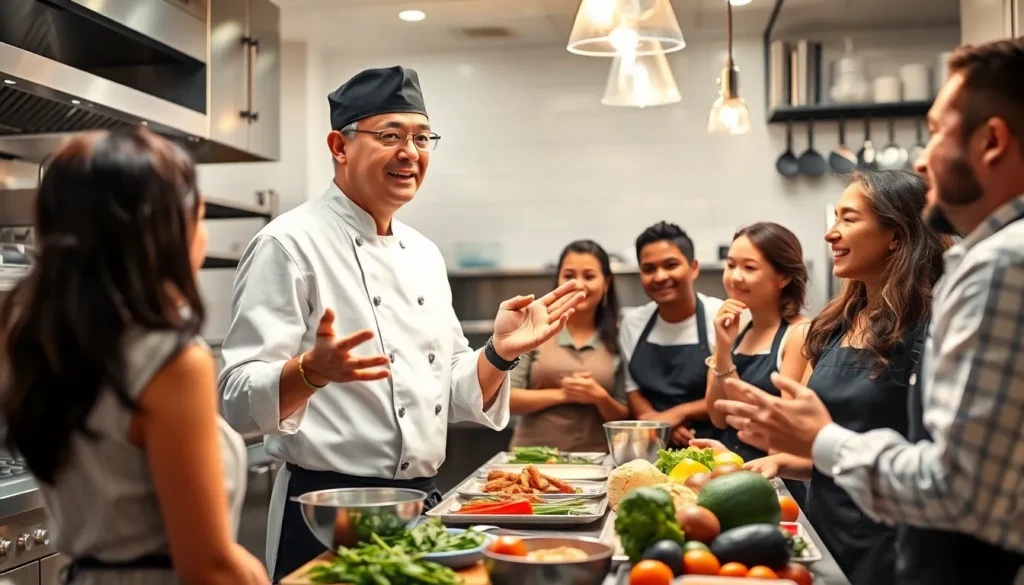In the bustling world of restaurants, leadership isn’t just about calling the shots; it’s about serving up a recipe for success. Whether it’s managing a team of culinary wizards or navigating the chaos of a dinner rush, effective leadership can mean the difference between a Michelin star and a one-star review.
Table of Contents
ToggleImportance Of Leadership In Restaurants
Effective leadership directly influences a restaurant’s culture and environment. Strong leaders inspire teams, fostering a collaborative atmosphere that enhances productivity and morale. Communication skills play a crucial role; clear instructions and active listening create trust between management and staff.
A well-defined vision sets the tone for overall operations. Leaders who articulate goals effectively motivate employees to align their efforts with the restaurant’s mission. During high-pressure moments, approachable leadership helps in addressing issues promptly, reducing stress and maintaining service quality.
Team engagement is critical in this industry. Leaders who prioritize staff training build a knowledgeable workforce, improving service excellence and customer satisfaction. Empowering employees through delegation leads to enhanced decision-making, benefiting the restaurant’s workflow and efficiency.
In addition, financial management hinges on strong leadership. Leaders who understand budgeting, cost control, and pricing strategies help maintain profitability. They also identify opportunities for innovation, ensuring the restaurant stays competitive in a fast-paced market.
Handling feedback is another essential leadership quality. Leaders who embrace constructive criticism from both customers and employees can adapt operational strategies, enhancing service and dining experiences. By promoting a culture of accountability, they boost employee ownership and commitment.
Ultimately, successful leadership shapes a restaurant’s legacy. Exceptional leaders not only improve immediate operations but also establish a foundation for sustainable growth and strong community relationships.
Key Leadership Qualities For Restaurant Success

Effective leadership in restaurants hinges on key qualities that foster success. These qualities, from communication to emotional intelligence, empower teams and enhance operational efficiency.
Communication Skills
Clear communication serves as the backbone of a successful restaurant. Leaders convey expectations through concise instructions. Listening actively to team members fosters an open dialogue, building trust and camaraderie. Regular check-ins maintain an understanding of team dynamics and operational challenges. Transparent communication with customers also enhances relationships, promoting loyalty and satisfaction. By prioritizing clarity, leaders create an environment where information flows freely, leading to improved service delivery.
Emotional Intelligence
Emotional intelligence plays a crucial role in effective restaurant leadership. Understanding team members’ feelings and motivations helps leaders respond appropriately in high-pressure situations. Leaders with high emotional intelligence navigate conflicts with empathy, creating a supportive atmosphere. Recognizing individual strengths and weaknesses allows for tailored coaching and development opportunities. These leaders inspire their teams by fostering resilience and adaptability, ultimately enhancing not just employee morale but also customer experiences. Prioritizing emotional intelligence leads to stronger relationships that enhance the overall restaurant culture.
Effective Team Management Strategies
Strong team management strategies drive restaurant success. Highlighting key elements fosters an environment where teams thrive.
Building A Strong Team Culture
Establishing a strong team culture significantly impacts performance. Creating an inclusive atmosphere encourages collaboration and inspires creativity. Engaging team members through regular team-building activities strengthens relationships. Leaders can cultivate open communication channels, enabling honest feedback and shared ideas. Recognizing individual contributions boosts morale and reinforces alignment with the restaurant’s mission. This sense of belonging ultimately leads to enhanced productivity and accountability within the restaurant.
Conflict Resolution Techniques
Implementing effective conflict resolution techniques prevents issues from escalating. Addressing conflicts promptly fosters a healthy work environment. Leaders should encourage open dialogue, allowing team members to express feelings respectfully. Utilizing active listening skills ensures all perspectives are validated, contributing to collaborative solutions. Mediators can step in when necessary, guiding discussions toward resolution. By promoting a culture that embraces feedback, employees feel empowered and valued, reducing friction. Ultimately, these strategies enhance team cohesion and improve overall service quality.
Adapting To Change In The Restaurant Industry
Change in the restaurant industry occurs rapidly, and leaders must adapt effectively. Successful leaders anticipate market shifts and respond proactively. They analyze customer preferences and emerging trends to ensure relevance.
Flexibility is crucial for operational success. Leaders who embrace new technologies streamline processes, enhancing efficiency and customer service. Additionally, adapting menus to reflect seasonal ingredients attracts repeat customers and engages local suppliers.
Training staff to handle change empowers teams. Regular skill development ensures employees adapt to evolving service models and customer expectations. Engaging employees in this process fosters loyalty and commitment.
Maintaining open communication channels is essential during transitions. Leaders should regularly solicit feedback from team members regarding implemented changes. This practice cultivates trust and encourages collaborative problem-solving.
Leveraging data analytics can guide strategic decisions. By tracking sales trends and customer feedback, leaders identify areas for improvement and innovation. Utilizing these insights drives informed decision-making.
A strong vision guides adaptation during uncertainty. Leaders who clearly articulate their goals motivate teams to align efforts with the restaurant’s mission. This alignment fuels resilience against market fluctuations.
Finally, embracing a culture of experimentation allows restaurants to innovate. Leaders who encourage creative thinking enable teams to test new ideas and concepts. This willingness to explore enhances the overall guest experience and supports long-term growth.
Learning From Successful Restaurant Leaders
Successful restaurant leaders provide valuable lessons in creating effective management strategies. They prioritize clear communication, which serves as the backbone of restaurant operations. Great leaders consistently articulate expectations. By fostering open dialogue, they build trust among team members.
Additionally, emotional intelligence plays a critical role in leadership. Active leaders recognize the importance of understanding individual strengths. They tailor coaching methods to meet each employee’s unique needs. During high-pressure situations, empathetic responses help resolve conflicts and maintain team cohesion.
Innovative team management strategies enhance overall success. Strong leaders focus on cultivating a positive team culture. Inclusive atmospheres encourage collaboration and inspire creativity. Regular team-building activities further strengthen relationships, making team members feel valued.
Addressing conflicts promptly prevents them from escalating. Leaders who promote open dialogue encourage healthy discussions. Validating all perspectives fosters collaborative solutions, enhancing workplace harmony.
Flexibility remains crucial in adapting to industry changes. Successful leaders anticipate shifts in market trends and customer preferences. They leverage new technologies that streamline operations and improve customer service. Empowering staff to handle changes fosters loyalty and commitment within teams.
Moreover, soliciting feedback during transitions maintains open communication. Gathering insights from team members allows leaders to make informed decisions. Utilizing data analytics guides strategic planning, enabling leaders to track performance indicators effectively.
Creating a strong vision along with a culture of experimentation drives innovation. Teams encouraged to test new ideas enhance the overall guest experience. These leadership lessons contribute to sustainable growth within the restaurant industry.
Effective leadership is the cornerstone of success in the restaurant industry. It shapes not only the operational framework but also the culture and morale of the team. Leaders who prioritize communication and emotional intelligence create an environment where employees feel valued and engaged.
By fostering collaboration and promoting accountability, they enhance service quality and customer satisfaction. Adapting to changes and embracing innovation further positions restaurants for sustainable growth. Ultimately, strong leadership lays the foundation for a thriving establishment that resonates with both staff and patrons alike.




